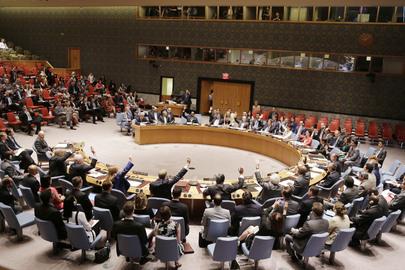RUSSIA'S ABUSE OF THE SECURITY COUNCIL: A THREAT TO INTERNATIONAL LAW

Diego Arria former Venezuelan Ambassador UN
José Ignacio Hernández Kennedy School, Harvard
The United Nations Security Council has a critical role in advancing the rule of law and maintaining international peace and security. However, during Russia's presidency of the Council, we have witnessed its blatant violations of the core principles of the UN Charter and its attempts to manipulate the Council. Nothing illustrates the point more: while Putin was invading Ukraine in February 2022, his representative presided over the Council.
This was just the beginning. Since then, Russia has used the Security Council not to maintain peace and security, but to further its interests, even if that means violating International Law. Recently, Russia misused the Arria Formula to organize a Council meeting where Maria Lvova-Belova addressed the Council. Russia pretended to broadcast the session using the UN media, although the broadcast was not allowed.
The Arria Formula is an informal arrangement that allows the Council greater flexibility to be briefed about international peace and security issues since it was first implemented in March 1992. But Russia invoked this arrangement not to advance peace and security but to spread misinformation regarding crimes against humanity committed against Ukrainian children by inviting Lvova-Belova, who the ICC alleges is responsible for the war crime of unlawful displacement of Ukrainian children.
The violation of the Arria Formula is a consequence of a grave deviation. Based on the core rule of law values embedded in the U.N. Charter, necessary to maintain international peace and security, Russia should not be allowed to participate in meetings that address the Ukraine situation.
A key universal value of the rule of law, accepted by the International Court of Justice, is that no one can be a judge in their own cause (nemo iudex in causa sua). The Security Council must be subject to these principles and other basic principles related to fairness and justice. The unique functions that the Charter vest in the Security Council justify the modulation of those principles to ensure peace and security protection. However, vilifying these principles to facilitate gross human rights violations is censurable.
Russia's presidency of the Security Council provides it with a platform to further its aggressive agenda, allowing it to act as a judge in its own aggressive actions towards Ukraine. Unfortunately, past instances have shown that the Council's formal procedures, such as the veto power, have allowed for the deliberate dissemination of false information. These practices will likely persist during Russia's tenure as the rotating president. As stated by Ukraine's Foreign Minister Dmytro Kuleba, it is "a slap in the face to the international community.”
It is urgent to put an end to Russia's autocratic manipulations of the Security Council. The Council's proceedings must be guided by the universal principles of the rule of law, enshrined in the Charter, and not by the self-interest of any member state. Failure to act undermines the credibility and effectiveness of the Security Council and threatens the very foundations of International Law.
It is crucial for the other permanent members of the Security Council, namely China, France, the United States, and the U.K., to take responsibility and prevent Russia from weaponizing the Council for its agenda. Upholding the universal principles of justice and fairness demands that these members prevent Russia from steering Council meetings to address the Ukraine invasion, which would render the Council nothing more than a hollow shell.